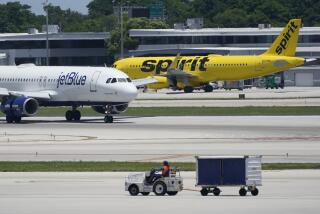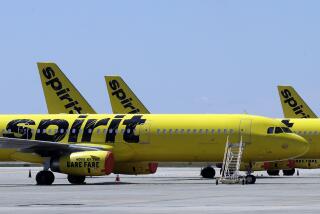Airline Linkups Draw Scrutiny
- Share via
WASHINGTON — Antitrust authorities and lawmakers on Friday said they will look closely at the increasing marketing partnerships between big U.S. airlines.
The alliances, dubbed “virtual mergers,” come at a time when regulators and Congress are putting pressure on major carriers to make room for smaller, low-fare competitors.
“This news only heightens our zeal to move forward with pro-consumer legislation to promote new airline entry,” Senate Commerce Committee Chairman John McCain (R-Ariz.) said.
AMR Corp.’s American Airlines, which had considered acquiring or teaming up with US Airways three times since 1994, on Thursday announced an extensive marketing alliance between the two carriers. Northwest Airlines and Continental Airlines announced a similar deal in January that would link the No. 4 and 5 airlines’ systems.
Another deal, between UAL Corp.’s No. 1 United Airlines and No. 3 Delta Air Lines Inc., was put on hold Friday after union pilots expressed concern about the possible impact on their jobs.
United issued a brief statement Friday acknowledging that it has been in discussions with Delta and said the discussions “may or may not be resumed in the future.”
The deals center around the joint marketing of flights, known as code sharing, and merging of frequent-flier reward programs, with varying degrees of cooperation beyond that. But the linkups have raised concerns at the highest levels.
Although code-sharing deals technically don’t require government approval, regulators are taking notice.
President Clinton said Friday that the American-US Airways announcement “should provoke a lot of comment, a lot of thought.” But he said the White House had not fully considered the possible antitrust implications.
Antitrust officials at the Justice Department, which is already reviewing the Northwest-Continental pact, said they may review the deal.
“It’s something that we’d be interested in taking a look at,” said Gina Talamona, Justice Department spokeswoman. “Whenever we would look at these kinds of things, it would be at the competitive effects.”
The Transportation Department, meanwhile, will take a thorough look at the competitive climate, Secretary Rodney Slater said Friday.
“We aren’t seeking to re-regulate the industry, because we’ve benefited too much from a deregulated industry,” he said. But officials, he said, also need to ensure a pro-competitive, pro-safety environment.
Airline stocks fell amid the concerns. Shares of US Airways Group dropped $3.31 to close at $73.69; Delta, considered the most vulnerable of the big airlines without a partner, fell $3 to $117.38; AMR lost $3.19 to $152.06; and UAL declined 94 cents to $89.63. All trade on the New York Stock Exchange.
The marketing and routing partnerships are the ‘90s version of classical mergers, analysts say, and that causes concern about passengers’ pocketbooks.
“I don’t want to be a Chicken Little, but I think the sky may be falling,” said Paul Hudson, executive director of the Aviation Consumer Action Project. “We’ve been concerned that alliances equal cartels, and this would essentially make the U.S. industry not competitive, at least not like it’s been over the last 20 years.”
The less competition, the higher consumer prices, experts say. Consumers would also get increased options to redeem frequent-flier miles on participating airlines. Travelers would also find that the airlines are selling seats on one another’s flights.
Mark Shields, vice president of Mercer Management Consulting, thinks the benefits from the combined airlines would counter the upward pressure on price.
“The good news for consumers is a harmonization of schedules, making it easier to connect and get from one place to another. Also, the extension of benefits for frequent fliers could be a significant plus,” he said.
More to Read
Inside the business of entertainment
The Wide Shot brings you news, analysis and insights on everything from streaming wars to production — and what it all means for the future.
You may occasionally receive promotional content from the Los Angeles Times.










